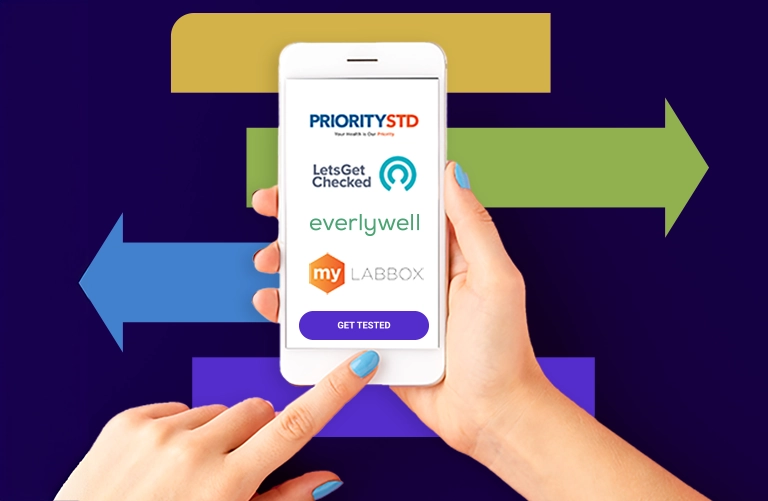Understanding HIV: Symptoms, Testing, & Treatment
Understanding HIV: Symptoms, Testing, & Treatment
Human immunodeficiency virus, or HIV, is an STD that attacks the body’s immune system, leading to difficulties naturally fighting off otherwise simple infections or illnesses. Many people may have flu-like symptoms after infection, while others have no symptoms at all, so the only way to know if you have HIV is to be tested. Learn more about this STD, what symptoms it may cause, how it can affect the body, testing procedures, and available treatment options.
Get Tested for HIV
ABOUT HIV
What Is HIV And How Does It Affect Your Body?
ABOUT HIV
What Is HIV And How Does It Affect Your Body?
HIV is a virus that specifically attacks the body’s immune system. Everyone who engages in unprotected sexual activity is at risk of contracting HIV. The disease can also be spread from a pregnant person to an unborn baby, although advances in prevention and treatment methods are making this less common.
Some individuals contract HIV through blood-to-blood contact, such as sharing needles, syringes, or other drug equipment. As an STD, there are several factors that can put you more at risk including having:
Many people infected with HIV will experience flu-like symptoms roughly 2 to 4 weeks after infection. These symptoms may last anywhere from a few days to a few weeks and include:
- Fever
- Sore throat
- Swollen lymph nodes
- Rash
- Muscle aches
- Night sweats
- Mouth ulcers
- Chills
- Fatigue
Others may experience no symptoms at all. The only way to truly know if you have HIV is to get tested.
Although HIV is not curable, early treatment is essential to living a long, healthy life. Untreated HIV can develop into acquired immunodeficiency syndrome, or AIDS, leading to serious illnesses and death, usually within about three years.
Source: STDs and HIV – CDC Basic Fact Sheet and CDC, Ways HIV Can Be Transmitted and CDC, About HIV
Specific Testing Information For HIV
When testing for HIV, there are several options, all of which utilize a blood sample. Antibody tests look specifically for the presence of HIV antibodies in the blood or oral fluid and are available as self-tests. However, these tests will not be able to detect infection as quickly as those performed with an actual blood draw from a vein.
Antigen/antibody tests are performed in a lab and require a blood sample drawn from a vein. These are specifically looking for the presence of both HIV antibodies and antigens in the bloodstream.
A nucleic acid test, or NAT, looks for the presence of the actual virus in the blood. This will require a blood sample drawn directly from a vein that is then sent to a lab. This test is able to detect HIV sooner than other tests available and is ideal for those who have had a recent exposure or possible exposure and are exhibiting early symptoms but tested negative with antibody or antigen/antibody tests.
Source: CDC, Types of HIV Tests
The timeline of when you will receive your test results depend on the type of test you had performed. Clinics offering rapid antibody tests may provide results in as little as 30 minutes. If you received a NAT or antigen/antibody lab test, it may be several days before you receive your results.
While HIV is not curable, it can be managed using antiretroviral therapy, or ART. This treatment involves taking medication as prescribed by a physician and reducing the amount of HIV in the body to help you stay healthy. These treatments generally have the virus under control within six months.
Treatment should begin right away, even if you are otherwise healthy, as delays could result in permanent harm to your immune system, put you at higher risk of transmitting HIV to partners, or developing AIDS.
Taking your HIV treatment as directed prevents transmitting the disease to others. As long as the viral load is undetectable, you will not transmit HIV through sex. If you do not have HIV but are at an increased risk of contracting the disease, you can take medications, such as PrEP to help lower your risk of getting HIV from a partner.
Source: CDC, HIV Treatment
- Everyone between the ages of 13 and 64 should be tested at least once in their lifetime
- Anyone who is pregnant
- Sexually active gay or bisexual men may require more frequent testing
- Those who have had sex with an infected partner
- Those who have had sex with multiple partners since last tested for HIV
- Anyone who has shared needles, syringes, or other drug injecting equipment
- Those who have been diagnosed or treated for another STD, hepatitis, or tuberculosis (TB)
Source: CDC – HIV, Getting Tested